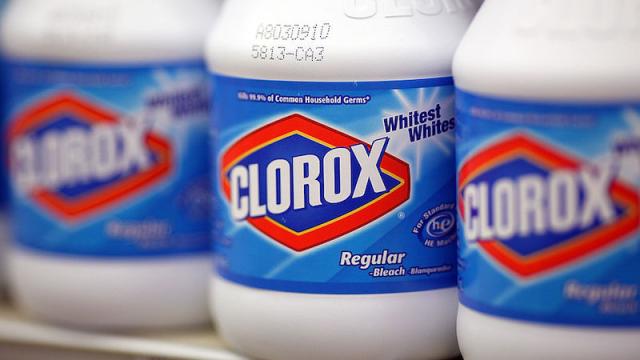Although President Donald Trump has said that he was only being sarcastic when he suggested people inject disinfectant into the body to cure coronavirus, there are some Americans who do not think that this idea is a joke. In fact, according to a recent survey by the Centres for Disease Control and Prevention (CDC), some people in the U.S. are using disinfectant and cleaning products in alarming ways during the pandemic.
[referenced url=”https://gizmodo.com.au/2020/06/latest-coronavirus-science-new-yorks-hopeful-road-to-recovery/” thumb=”https://gizmodo.com.au/wp-content/uploads/2020/06/06/kkaqwwyqc2rzbamwd635-300×168.jpg” title=”Latest Coronavirus Science: New York’s Hopeful Road to Recovery” excerpt=”Here are some of the latest scientific developments around covid-19, including insights about the first major outbreak in Wuhan, China, a raft of hydroxychloroquine treatment trials, and steady progress in some but not all areas of the U.S.”]
The CDC conducted the online survey on 502 U.S. adults in May, shortly after Trump made his mind-boggling and dangerous comments about disinfectants, and published it on Friday. The survey found that 39 per cent of respondents had engaged in at least one high-risk practice not recommended by the CDC to prevent SARS-CoV-2, the official name of the novel coronavirus that causes the disease covid-19.
The CDC carried out the survey after a spike in calls to poison centres about exposures to cleaners and disinfectants during the pandemic. It sought to obtain “contextual and behavioural insight” into this increase in calls and to inform timely and relevant prevention strategies.
The most common alarming practices included applying bleach to food items and using household cleaning and disinfectant products on the skin. The CDC found that survey respondents were also misting their body with cleaning or disinfectant spray, inhaling vapors from household cleaners or disinfectants, and drinking or gargling bleach solutions, soapy water, and other cleaning and disinfectant solutions.
“These practices pose a risk of severe tissue damage and corrosive injury and should be strictly avoided,” the CDC stated in its report. “Although adverse health effects reported by respondents could not be attributed to their engaging in high-risk practices, the association between these high-risk practices and reported adverse health effects indicates a need for public messaging regarding safe and effective cleaning and disinfection practices aimed at preventing SARS-CoV-2 transmission in households.”
[referenced url=”https://gizmodo.com.au/2020/06/singapore-plans-to-roll-out-its-own-contact-tracing-wearable/” thumb=”https://gizmodo.com.au/wp-content/uploads/2020/06/06/vhwfqiy0hz8uqmzrhg1n-300×168.jpg” title=”Singapore Plans to Roll Out Its Own Contact-Tracing Wearable” excerpt=”As several countries mull how best to utilise contact-tracing technology, Singapore is planning to issue virus-tracking wearables to each of its 5.7 million residents.”]
Overall, the survey found that people had engaged in a range of practices in the previous month to prevent coronavirus. Sixty per cent reported more frequent home cleaning or disinfection compared to previous months.
In terms of adverse health effects, 25 per cent reported conditions that they believed had resulted from using cleaners and disinfectants, including nose or sinus irritation, skin irritation, eye irritation, dizziness, lightheadedness, headache, upset stomach, nausea, and breathing problems.
Per the CDC, respondents who reported engaging in at least one high-risk practice more frequently reported an adverse health effect than those who did not report engaging in such practices, a rate of 39 per cent compared to 16 per cent.
The survey also identified “important knowledge gaps” in the safe use of cleaners and disinfectants among U.S. adults. For instance, just 23 per cent of those surveyed knew that only room temperature water should be used to prepare dilute bleach solutions, while only 35 per cent said that bleach should not be mixed with vinegar. Only 58 per cent said that bleach should not be mixed with ammonia.
[referenced url=”https://gizmodo.com.au/2020/06/should-you-get-a-coronavirus-test-if-you-protested/” thumb=”https://gizmodo.com.au/wp-content/uploads/2020/06/05/xeaxyehefer5hsipsb3l-300×169.jpg” title=”Should You Get a Coronavirus Test If You Protested?” excerpt=”The nationwide protests against police brutality in the wake of George Floyd’s death are unfortunately not happening in a vacuum — we’re still very much in the midst of a once-in-a-century viral pandemic spread by close contact. This week, officials in Texas and New York said that demonstrators should get…”]
“Covid-19 prevention messages should continue to emphasise evidence-based, safe practices such as frequent hand hygiene and frequent cleaning and disinfection of high-touch surfaces. These messages should include specific recommendations for the safe use of cleaners and disinfectants,” the CDC said.
Although the survey responses were weighted to be nationally representative of U.S. demographics, the agency said that it was difficult to determine whether the responses in the survey are truly representative of the broader U.S. population. Other survey limitations include social desirability bias and ongoing shifts in public opinion over time, among others.
